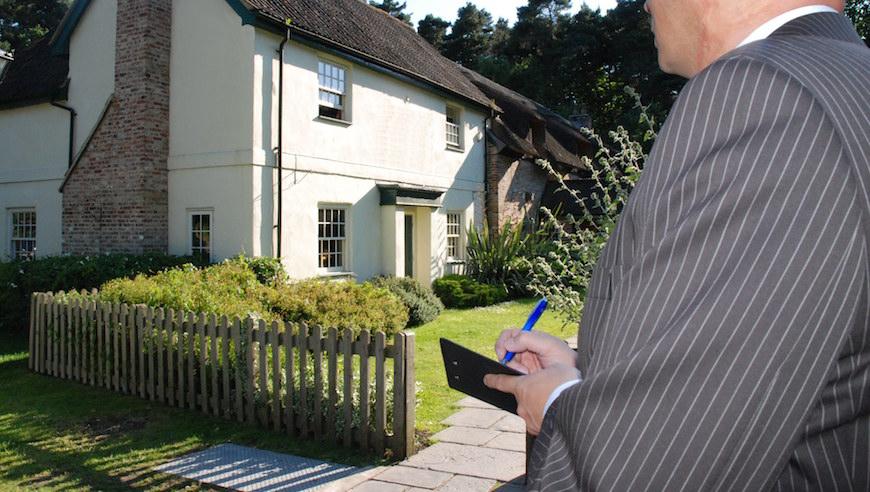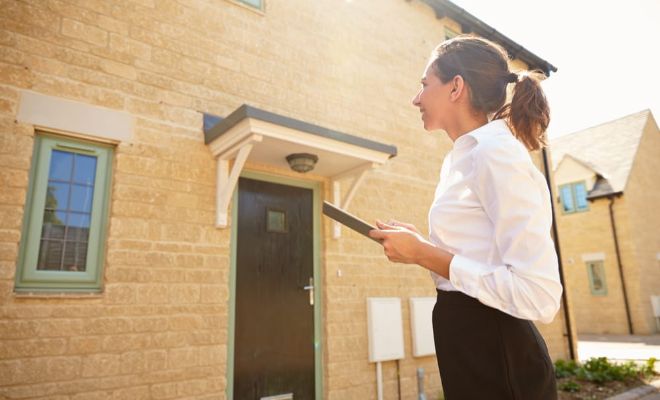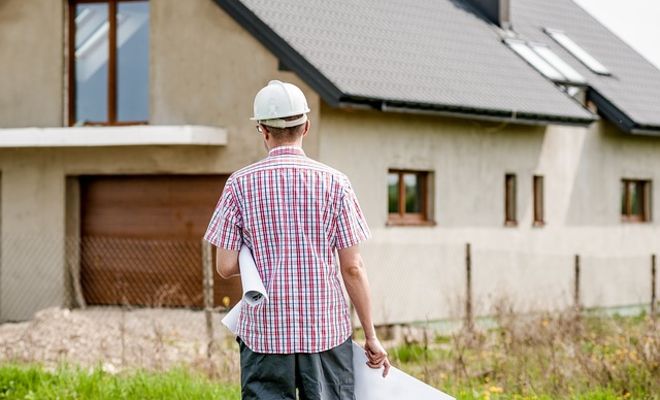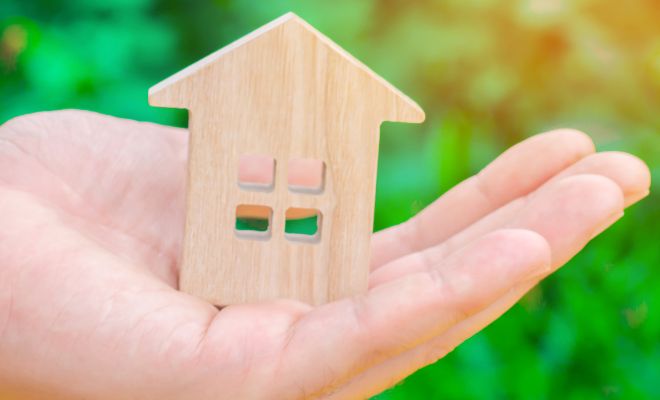House Survey Cost
Last updated 30th January, 2024
Interested in how much a house survey costs?
This article breaks down all the costs involved with different types of house surveys. We cover a home buyers survey, building survey and full structural survey. On average you can expect to pay between £350-£400.
Keep reading for more information!

How Much Does a House Survey Cost?
The average cost of a home survey should be somewhere in the region of £350- £400.
However, there are a lot of factors to consider; the first being what type of survey you want to be conducted.
Generally, there are five major types of house surveys, namely:
- Condition Report
- Homebuyers Report
- Home Condition Survey
- Building Survey
- Snagging Surveys
Here is a quick review of each report and how much they cost on average:
Condition Report
This is the most commonly used for houses that are relatively new and in good condition. It includes surface level inspections that check for some of the more obvious problems.
That said, it can also reveal deeper problems, although it won’t highlight the full extent of the problem. The price for this type of survey is between £350- £400, and as such, it is one of the more common surveys requested.
Homebuyers Report
This goes a little more in-depth and is the most common house survey requested. It’s a little more expensive and should cost you somewhere between £500- £600.
Also, it doesn’t take too long to complete, and the surveyor should be completed in about 3 hours. Problems such as subsidence and damp are usually noticed at this level of surveying.
In addition, the professional surveyor might provide some solutions to fix the problems highlighted.
RPSA Home Condition Survey
This survey is carried out by experts more versed in residential homes.
As you can imagine, this is a better fit for residential homes and will set you back anywhere between £450-£1000.
Building Survey
This report is the most immersive. With this stage, surveyors provide detailed reports of any issues encountered while at work and solutions to these problems.
This level of work is substantial, and as such, building surveys can be pretty pricey, and you can expect a bill of anywhere between £700- £1000 and such a project is only advisable if you are buying an old or obviously defective home.
Snagging Surveys
These types of reports are best implemented for new homes with fewer problems to contend with.
That said, a survey should cost between £350-£500 and should take a couple of hours at most.
What Do the Costs Depend On?
House survey costs are not static and depend on several factors, including the size, value, and location of the property.
For instance, if you live far away from the surveyor, it might add to the cost of house survey. Another factor that has to be taken into consideration is the ease of access to the property.
Hence, if the house is difficult to access or features challenging terrain, this could add a few quid to your final bill.
In addition, the value and size of the property will also affect matters as surveyors are likely to have more places to check out in a larger home which, naturally, means more labour and a higher cost.
Table of Contents
House Survey Prices
For a deeper understanding of the prices involved in a house survey report, you can examine the table below.
| SURVEY TYPE | WHAT IT COVERS | PRICE | DURATION |
|---|---|---|---|
| New build snagging report | Unlike other types of surveys, this one focuses on a few details that might have been missed during construction. | £350- £500 | 2- 3 hours |
| Condition report | This covers new or homes in good condition. The surveyor does a surface level check to ensure that everything is on the up and up. | £350- £500 | 2- 3 hours |
| Homebuyers report | This is the second level which goes a little deeper to check for existing issues. Also, the surveyor might recommend ways to rectify the issues. | £500- £650 | 3 hours |
| House Building survey | This is the most tasking of all the surveys, and with this level, the surveyor provides a detailed report on all the issues with the home. | £700- £1000 | 4- 5 hours |
| Home Condition Survey (RPSA) | This is a home survey carried out by professionals with more experience with residential homes. The results of the survey are also independently checked to ensure consistency. | £450- £1000 | 2- 4 hours |
Additional Costs
Typically, when considering the full house survey cost, the most important factor is the size and value of the house.
Therefore, the only thing you generally have to pay for is the survey.
However, this is the best case scenario, as you might find yourself spending money if a couple of problems are revealed.
Below, we’ll examine some of the more common problems a surveyor might encounter and what to do in these situations.
Damp
Simply put, damp is a problematic condition that can affect the building’s structure. It is built-up moisture that slowly seeps through the building causing damage over time.
Unfortunately, this is a rather common problem in the UK due to weather conditions. If you feel there might be a damp problem in your home, it is advisable to engage a professional as soon as possible.
Depending on the size of your home, the cost of a damp survey should be between £200- £400 and shouldn’t take more than two hours.
If your house has a damp problem, the surveyor will advise you on steps to take to handle the problem.
Electrical Issues
If you purchase an older home, there is a possibility that it would have electricity issues brought on by age. Therefore, it is possible that rewiring the house is necessary for which you’ll need to engage an electrician.
Depending on the size of the house, the cost of rewiring a house should be between £1500- £3500.
This will include hourly rates, external help, and so on. The electrician will have to ensure that they fit in new, and secure electrical outlets to improve the safety of the house.
Heating Issues
There is a myriad of heating issues that might affect your home that will need to be solved.
The most common one is the central heating system which might need a flush.
To achieve this, you’ll need a professional and depending on several factors; it should cost you anywhere from £300- £500 and take about a day. This is a job that requires a certified plumber who will fire up the boiler and check all the radiators for cold spots.
Structural Issues
In the worst case scenario, the surveyor might discover structural issues with the home, which might require the services of a structural engineer. This could range from faulty structures to crumbling walls.
If you engage a structural engineer, you’ll need to consider a between £50-£90 per hour fee. This could increase depending on the amount of time the inspection takes.
Also, the job that needs to be done might cost even more as the inspection fees are different from the cost of labour. While this could quickly rack up, the importance of a structural engineer cannot be downplayed.
This is because your safety is on the line if you persist with a structurally compromised house. These are all extra costs you might incur in the process of surveying the home.
It is important to know about any defects the house might have as it might help you negotiate for a lower price from the seller. Also, if the problems are too much, or too expensive, then it might be best to abandon your plans to purchase the house.
This way, you can save money and focus your energies elsewhere.
Cost Breakdown Calculator
Average cost for a house survey - Total Cost: £700
Materials
£70
Trademen
£630
Waste removal
£0
Labour Costs and Time Frames
As previously mentioned, there are generally five houses survey types carried out, and the cost varies depending on the type you go for. But there is no seperate labour costs as such, as the cost for a survey is in all-in-one.
For any house survey, it should take 2-3 hours to complete.
Cost Affecting Factors of a House Survey
Survey costs buying a house are very important as they determine how good a deal you’re getting.
For instance, if you spend significantly on surveys for a home which has to undergo repairs, you’ll have to wonder if it is worth it.
On top of that, there are a couple of factors that could alter the price of the project, some of which will be examined below.
Size of the House
Typically, the larger a house, the more money it will cost to have it surveyed. As you can imagine, larger homes have more places to check, which means the surveyor will likely spend more time checking for issues to report.
So, a 5-bedroom home will cost a pretty penny while a two bedroom apartment will be relatively affordable. However, you might be able to score a sweet deal with the professionals if you have a larger home as they might reduce the amount you’ll pay per square foot.
So, while a three bedroom home might cost somewhere between £350-£400, a six bedroom apartment might be around £600.
Location
Time is an important factor when pricing a job, and for this reason, it is always best to go for a local surveyor. For professionals who travel significant distances to reach your home, you might have to pay a bit more.
Most professionals charge labour from the moment they step out of their offices which means a lengthy travel time could really increase the price.
In addition, surveyors in remote areas could cost more due to less competition, and more demand. However, if you trust the surveyors who are coming to do the job, then the extra money might be worth it.
Ease of Access
This usually pertains to the difficulty a surveyor might encounter while on the job.

For instance, if your home features difficult terrain, your surveying costs might be more as the professional has to overcome some challenges. Also, a home with a complicated layout that might be more difficult to investigate will also attract higher fees to compensate the professional for the work done.
Type of House
This is also an important consideration as it affects the amount of money the surveyor will request.
For instance, a flat home with no stairs or upper levels will be a lot cheaper than a home with all the bells and whistles.
Therefore, duplexes of homes with multiple floors could cost quite a bit more than typical homes.
Type of Survey
Finally, the type of survey is also pretty important as it determines the amount of work the surveyor will put in.
For example, a condition report only requires the tradesperson to have a cursory glance around the place to ensure that everything is in place.
Therefore, it wouldn’t cost as much as the other types of surveys. Conversely, homebuyer’s report and building surveys involve significantly more work which includes reports and recommendations in case of problems.
Hence, they will set you back more than other types of surveys.
What Does a House Survey Entail?
You might be tempted to believe that a surveying job is easy since all the professional does is effectively look around the house to ensure that everything is running smoothly.
However, this would be a wrong assumption as their job involves a lot of work, and there are several things a surveyor will notice that you would otherwise miss.
In this section, we’ll examine the checks a surveyor has to run through to ensure that the house is safe.
The Property
This might not take too long, but it is important that the surveyor has a look at the property in its entirety.
So, factors like distance to other houses, the road, and so on are all taken into consideration in this situation.
History
The building’s history is of great importance to the surveyor. This is because it provides information as to some of the potential problems that could be found.
For instance, older homes are likely to have outdated wiring which might need the attention of an electrician.
Therefore, knowing the age of the building will help the surveyor do a better job and focus on a couple of areas that need scrutiny.
Roof
Next up, the surveyor will likely take a look at the roof to ensure that it is in good shape. To achieve this, the surveyor will try to get a good look at the roof from different angles.
Additionally, the surveyor will also inspect the coverings and gutters around the roof to determine if they are in good shape.
Walls
Walls make up a significant portion of the house, and it is incredibly important that they are in good condition as the opposite could cause you potential harm.
Therefore, the surveyor will assess the straightness of the wall, subsidence, how strong the walls are, and in some cases, the finish used between the bricks in the house.
If there are significant problems, it might require the services of a structural engineer.
Hazardous Materials
Depending on the age of the house, it might have been built using asbestos which is a very dangerous material.
This is evidenced by the numerous cases of cancer and other diseases attributed to its presence. Therefore, a surveyor’s inspection can help discover this problem and proffer solutions.
Damp
This is a common problem with a lot of homes in the UK due mostly to climate. Damp might look innocuous at first, but if left unchecked, it could even damage the structure of the house.
To determine the presence of damp, the surveyor will likely make use of a moisture meter. If found, they will also check to see what caused it. Some of the most common causes are woodworms, poor timber, and lack of ventilation.
The Heating System
Heating problems might be discovered while inspecting the house, and you might need to get a specialist.
To check for issues, the surveyor will inspect all the radiators in the house along with the central heating system.
Wiring
Once more, if you are seeking to buy an old house, the electrical wiring might be outdated, or bad.
So, don’t be surprised to find the surveyor having a look at the fuse box.
Door and Windows
Doors and windows are also common homes for problems that you might not discover unless a deep inspection is carried out.
So, a surveyor will open up windows and doors and check their structural integrity. They might also check for evidence of pest damage from woodworm, or something else.
Loft
An old loft could be the site for a lot of problems in the home. Hence, if you have one, a surveyor is likely to take a close at it.
Among other things, they’ll check to see if the roof covering is adequate, the structure is sturdy and uncompromised, and if the wiring is well done and unproblematic. In many cases, surveyors might find problems in the loft caused by a poor DIY job or woodworm damage to some of the timber used in the building.
Subsequently, the inspector might also check the suitability of the insulation and any other issue that could come up. That said, the surveyor is not a repairman, so while they can tell you what needs to be done, or who to call, they can’t carry out the job themselves.
Therefore, if there are additional problems, you’ll need to dip into your wallet to pay the necessary tradesperson for the job. On the other hand, if the check goes smoothly and there are no problems, then you can heave a sigh of relief and buy the property with confidence.
DIY House Survey
While you could probably carry out a survey yourself, it is advised that you get a professional to do the job.
This is because there are a lot of things you could miss, which could come back to haunt you.
For instance, you might not have the necessary material to check for damp, or the required knowledge to know if the wiring in the house is suitable.
Furthermore, if you are getting a mortgage, you’ll be compelled to engage a surveyor to inspect the house, this is to put the lender at ease that the house is in good condition in case of a default.
If you are determined to carry out checks yourself, there are a few things that can be done.

One example is using Google maps to check the location of the home and the surrounding areas.
Therefore, you can determine if there are railway stations, malls or other amenities that could make your life easier.
Additionally, you can contact the local council to determine if there are any planning applications that affect the property.
On top of that, there are a few obvious checks you can undertake, including missing tiles, crumbling walls, broken doors or windows and so on.
Moreover, these checks could save you some money, especially with a new home which is less likely to have any problems.
However, if you are purchasing an old home, it is best to engage a professional as there is so much you could miss that will cause problems in future.
Types of House Survey
There are different types of house surveys all which have their uses and advantages.
In this section, we’ll examine the most common ones and the best times to use them.
Condition Report Cost
A condition report typically involves a cursory inspection of a home by a surveyor.
With this method, the appraisal of the house is not very intrusive and doesn’t go into much detail. It is also a pretty affordable option and shouldn’t cost more than £300-£450.
Conversely, it usually doesn’t detect some of the more obscure problems that the house might have. That said, it is usually best to use this method if the house is new or in relatively great condition.
Homebuyers Report
This goes a little further, and surveyors will spend about 2-3 hours checking out the house to see if there are any problems.
Because it goes further than the condition report, it is also more expensive and could cost anywhere from £500-£650.
On the bright side, most problems are identified at this point, and the surveyor will proffer solutions.

Most homeowners go for this option, and more often than not, it is a sufficient level of inspection to carry out.
However, if the house is an old one in obvious disrepair, then the homebuyer’s report might not be enough to unearth all the problems.
Building Survey
This is the highest level offered by the Royal Institution of Chartered Surveyors (RICS). With this level, the house is thoroughly inspected to ensure that there are no problems.
There is no stone left unturned during the inspection, which, in turn, takes a considerable amount of time to complete. Consequently, it is also pretty expensive and should set you back between £700-£1000.
If the house you’re purchasing is a new one, then this is simply an expensive project you can do without. However, if the house is aged, or has a history of problems, then it is probably best to have an expert look at it.
Home Condition Survey
The Royal Institution of Chartered Surveyors (RICS) aren’t the only ones that can provide quality surveys as the Residential Property Surveyors Association (RPSA) also supply a similar service. If the home is purchased in a residential area, then this might be the best option available.

This is because the project is embarked on by professionals who have more experience with residential homes. Therefore, they might pick up problems that other professionals might miss.
Also, this type of survey costs some money, and you can expect to spend between £400-£1000 on getting the project done.
New Build Snagging Survey
For new homes, a snagging survey is generally seen as the best option. Therefore, rather than looking for existing problems, the surveyor inspects the space and determines if the people who worked on it did a good job.
So, they might fund problems with the paintwork, wiring, and so on. This type of survey should cost between £300-£500 and shouldn’t take more than 2 hours.
Do I Need a House Survey?
Most homes require a survey before moving in as it lessens the chances of suffering from an accident or encountering a problem in the house.
A home survey notices problems and proffers solutions and could save your money, life, or both.

As mentioned before, if the house is new and in good condition, then you might not need anything more than a condition report.
On the other hand, if the house is crooked or in disrepair, especially when old, ensure that you engage a surveyor to inspect the entire space.
Benefits of a House Survey
There are a number of benefits to getting a house survey, some of which we’ll examine below.
It Saves you Money
If you move into a house without surveying it first, you might find yourself spending more money in the long run.
Worse still, if the problems are grave, you might even bring your family to harm.
It Could Reduce the Cost of the Property
Engaging a surveyor to look into a new property you want to purchase is a great way to potentially slash some of the house’s cost price.
For instance, if the house is old with significant issues, it is possible to negotiate with the seller for a cheaper price.
It Protects your Investment
Purchasing a house is no mean feat and requires considerable funds to pull off.
Therefore, it would be such a shame if the house turns out to be irredeemable, but you don’t find out until it’s too late because an inspection was not carried out.
FAQs
On the flip side, what if the survey went badly? Well, there are a few options, one of which is to pull out of the deal. Also, you could request that the seller makes repairs, or, you could renegotiate the price.
How to Find & Hire a House Surveyor
It is best to get the most qualified professional to undertake this job.
For this reason, you are advised to engage a member of the Royal Institution of Chartered Surveyors (RICS).
Sources
https://hoa.org.uk/advice/guides-for-homeowners/i-am-buying/what-sort-of-survey-should-i-have/
https://www.moneyadviceservice.org.uk/en/articles/a-guide-to-homebuyer-surveys-and-costs
https://www.comparemymove.com/advice/surveying/how-much-does-a-house-survey-cost
https://www.which.co.uk/money/mortgages-and-property/first-time-buyers/buying-a-home/house-surveys-akbw67f03dkx










